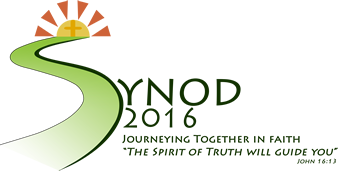Press Release
"Limerick Diocesan Synod an opportunity to reignite hope for Church"
– Bishop Leahy
First Irish Synod in half a century and first ever with such major participation of lay women and men begins in Limerick
400 delegates to consider 100 proposals across six themes to create new beginning for Diocese
The Limerick Diocesan Synod, which officially opened in St John's the Baptist Cathedral, Limerick on April 3rd, will be a time for reigniting hope and new beginnings for the Church across the Diocese, Bishop Brendan Leahy today states.
In his homily at the Opening Mass this evening of the Diocesan Synod, Bishop Leahy says that the Synod is the first in Ireland in half a century, the first in Limerick in 80 years and the first ever with such a major participation of lay women and men. It wants to build Christ’s Church with the renewed ardour and fire of holiness.
Almost 400 delegates, three quarters of them lay, will join at the Mass at the Cathedral of St. John the Baptist to officially launch the Synod, which culminates on Friday when the delegates gather for three days to consider over 100 proposals across six separate themes for the future direction of the Church in Limerick.
Addressing delegates, he quoted a text from an ageing Carlo Carretto, a member of the Little Brothers of Jesus, an order inspired by the spirituality of Charles de Foucauld:
‘How baffling you are, my church, and yet how much I love you! You have made me suffer more than anyone and yet I owe more to you than to anyone. I should like to see you destroyed and yet I need your presence. You have given me much scandal and yet you alone have made me understand holiness. Never in this world have I seen anything more compromised, more false, yet never have I touched anything more pure, more generous or more beautiful. Countless times I have felt like slamming the door of my soul in your face – and yet, every night, I have prayed that I might die in your sure arms! No, I cannot be free of you, for I am one with you, even if not completely you. Then too – where would I go? To build another church? But I could not build one without the same defects, for they are my defects. And again, if I were to build another church, it would be my church, not Christ’s church. No, I am old enough, I know better.’
Bishop Leahy said that that to build the Church there needs first to be “an acknowledgement in humility of its defects”. The Synod, Bishop Leahy said, will be an opportunity to take both the good and the bad of our Church life and “do our part to repair and remedy, to improve things, and thereby radiate Christ in our communities and our families, in our schools and social projects, among our young people and in our liturgy.”
Bishop Leahy said that the Synod is a chance for the whole Diocese to take significant steps to “help us begin together again in mission”.
“We need to acknowledge the failure and disappointment we see in our own wounds, those at the heart of the Church, in all that has not been right in the Church, in the complex situations of the world around us,” he said.
The Synod also invites the faithful of the Diocese to become in a new way instruments of the mission of Jesus Christ and to resurrect relationships of faith, hope and love all around us, “oases of mercy where many can come, saint and sinner alike”.
The Synod will also, Bishop Leahy added, lead the Diocese to contribute more to the renewal of society – from education to politics, from family to health, from art to science, from sport to city-planning, from business to agriculture and environment.
“While the Church in many parts is booming with creativity, we know that in Ireland we are experiencing a certain spiritual tiredness in a Church that is so often today referred to in terms of its failures, its wounds, its pierced side,” he said.
“Many in our day will say they are only hanging on in faith and in the Church by their fingertips. But, just as in the case of the ‘doubting Thomas’ in today’s Gosepl , our difficulties in belief and those of our contemporaries can often be the archway under which we pass to enter into a new experience of God present among us precisely when we least expect him.”
